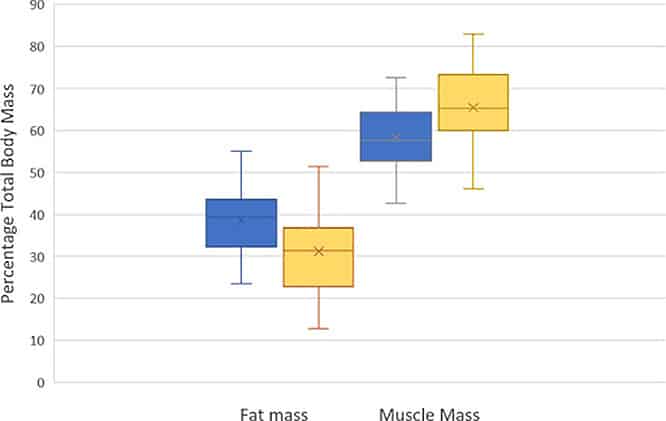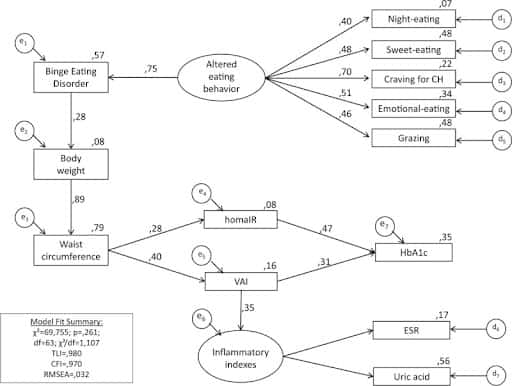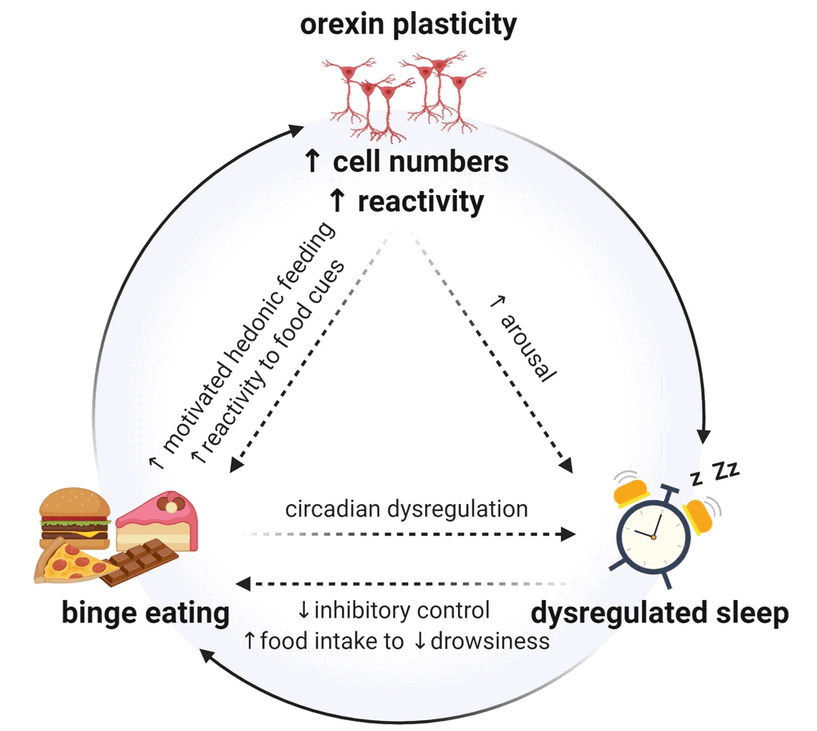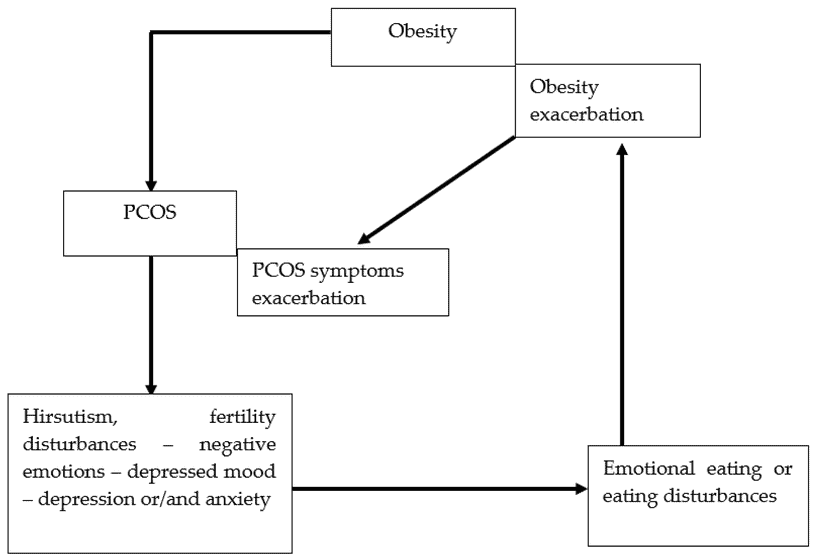
Carly Hanna
BSc (Human Nutrition and Psychology)
Binge eating disorder can become a very serious condition if left untreated.
Research and studies have shown the negative impacts on physical and mental health, with overweight and obese individuals being in a higher risk group.
Today we’ll talk about how binge eating can cause
- obesity
- insulin resistance
- joint problems
- poor sleep
- infertility
- gastrointestinal issues
- yo-yo dieting
If you’re experiencing any of these issues, and you’re finding yourself eating often and too much, we suggest you have a read, and later feel free to ask any questions in the comments section.
Binge eating increases the risk of weight gain and obesity
People often binge eat foods that are high in calories, fat and sugar, which can exaggerate weight gain.[1]
Over 60% of people with a binge eating disorder are overweight
Binge eating disorder is one causal factor of obesity, which can be associated with diet-related diseases such as cardiovascular disease. Heart disease, stroke, high cholesterol and high blood pressure can all result from gaining weight and having an unhealthy diet.[2,3]

As the figure above shows, individuals with binge eating disorder have a higher fat mass and lower muscle mass.[4]
This is likely to contribute to sarcopenic obesity, which is a type of obesity that suggests low skeletal muscle mass with high levels of adiposity (fat mass).
Having this type of obesity is likely to lead to an increased risk of cardiovascular disease and an increased risk of mortality.
Insulin resistance in binge eating and Type 2 diabetes
Binge eating can cause insulin resistance, meaning that the body can’t regulate blood sugar as well. Over time, this can increase your chance of developing Type 2 Diabetes.[5]

Binge eating behaviours (such as emotional eating, night eating, craving carbohydrates and sweet foods) have shown to have an indirect effect on waist circumference through increased body weight.[6]
An increased waist circumference has an effect on HbA1c levels (blood sugar) through insulin resistance and visceral adipose (body fat surrounding the organs, such as the liver and intestine).
This body fat (visceral adipose) then has a direct effect on the immune system, which will be discussed later.
Binge eating disorder causes joint problems
Binge eating can increase your risk of joint problems such as osteoarthritis (a condition where the cartilage at the end of the bones wears out over time).
This can be due to having a higher body weight and BMI resulting in extra load on the bones, joints and cartilage.
Binge eating increases the risk of bone degeneration
Binge eating impacts sleep quality
Binge eating has shown to cause sleep problems such as insomnia and sleep apnea.
Extreme fullness before going to sleep can cause difficulties falling asleep or staying asleep (insomnia) due to increased arousal.
Individuals who have a higher body weight are also more likely to suffer from sleep apnea due to fat build-up around the airways.[2,3]
RELATED — Sleep apnea: How to cure it and get your sleep back
Other sleep disruptions as a result of binge eating can include:

The image above explains the importance of orexin neurons that regulate
- sleep and wake states
- feeding behaviour
- homeostasis
- reward systems
- cognition
- mood
RELATED — Why we sleep: The role of sleep in our healthy life
Good sleep is an important part of being and staying healthy. Having poor sleep poses a greater risk of all-cause mortality by nearly 80%.
Binge eating and connection with fertility
Binge eating disorder can affect fertility for both men and women, and also for those who are already pregnant.
Some studies have shown that women with unexplained infertility or PCOS (polycystic ovarian syndrome, a type of endocrine infertility) have higher rates of past and current binge eating disorders than women with anatomic infertility, women with infertile male partners, or fertile women.[9]

Source: Burnatowska, E.; Wikarek, A.; Oboza, P.; Ogarek, N.; Glinianowicz, M.; Kocelak, P.; Olszanecka-Glinianowicz, M. Emotional Eating and Binge Eating Disorders and Night Eating Syndrome in Polycystic Ovary Syndrome—A Vicious Circle of Disease: A Systematic Review. Nutrients 2023
For those with current binge eating disorder or a history of binge eating disorder, there is also a higher risk of gestational diabetes and hypertension, as well as the need for an emergency cesarean birth.[3]
Binge eating and gastrointestinal problems
Binge eating can cause the stomach to enlarge and push on surrounding organs. Though this is very uncomfortable, it can also lead to gastrointestinal problems such as
Also, eating large amounts of food in one sitting is also likely to produce symptoms such as
In more serious cases of binge eating disorder, the stomach and/or esophagus can actually rupture which is a life-threatening emergency.
Binge eating can cause yo-yo dieting
It is common for people with binge eating disorder to fluctuate between dieting (restricting food intake) and binge eating. This is known as “yo-yo dieting”.
Yo-yo dieting is enforced by diet culture
With low-calorie diets being widely encouraged in the media, it is understandable that many people “fall off the wagon” and return to binge eating habits.
While the characteristics of binge eating disorder differ from anorexia nervosa and bulimia nervosa, yo-yo dieting is a problem that can occur across all eating disorders.
Related Questions
1. Which eating disorder is most common in men?
Binge eating is the most common eating disorder in men, compared to anorexia nervosa and bulimia nervosa, with around 35% of people with binge eating disorder being men.[11]
2. Are women more likely to binge eat than men?
Research shows that binge eating is more common in women than in men, and women are more likely to report concern over body image.[12]
3. Is binge eating a symptom of ADHD?
Those with ADHD may have more difficulty controlling eating due to the dysfunction of the brain’s reward system.[13]
If you liked this article and would like to know when Part 2 will be going live, feel free to Subscribe to our Newsletter, and we’ll let you know well in advance.
Having passion for mental health and nutrition, Carly’s goal is to become a registered psychologist with a focus on self-care – food, exercise, and sleep. She has a special interest in various mental health disorders, plant-based diets, and the relationship between food and mood.
Through evidence-based research, holistic approach to health and personal experience, Carly hopes to empower others’ well-being.
Carly is a part of the Content Team that brings you the latest research at D’Connect.
References
(1) Gaetani S, Romano A, Provensi G, Ricca V, Lutz T, Passani MB. Eating disorders: from bench to bedside and back. Journal of neurochemistry. 2016 Dec;139(5):691-9. Retrieved from https://doi.org/10.1111/jnc.13848
(2) Stephnia Watson. Serious health problems caused by binge eating disorder. WebMD. Oct 20 2021. Accessed online, retrieved from https://www.webmd.com/mental-health/eating-disorders/binge-eating-disorder/health-problems-binge-eating
(3) The Emily Program. Physical effects of binge eating disorder. Jan 31 2022. Accessed online, retrieved from https://www.emilyprogram.com/blog/physical-effects-of-binge-eating-disorder/
(4) Forlano R, Harlow C, Mullish BH, Thursz MR, Manousou P, Yee M. Binge‐eating disorder is associated with an unfavorable body mass composition in patients with non‐alcoholic fatty liver disease. International Journal of Eating Disorders. 2021 Nov;54(11):2025-30. Retrieved from https://doi.org/10.1002/eat.23584
(5) National Eating Disorder Association. Health consequences. 2022. Accessed online, retrieved from https://www.nationaleatingdisorders.org/health-consequences
(6) Succurro E, Segura-Garcia C, Ruffo M, Caroleo M, Rania M, Aloi M, De Fazio P, Sesti G, Arturi F. Obese patients with a binge eating disorder have an unfavorable metabolic and inflammatory profile. Medicine. 2015 Dec;94(52). Retrieved from https://doi.org/10.1097%2FMD.0000000000002098
(7) Tzischinsky O, Latzer Y, Epstein R, Tov N. Sleep‐wake cycles in women with binge eating disorder. International Journal of Eating Disorders. 2000 Jan;27(1):43-8. Retrieved from https://doi.org/10.1002/(SICI)1098-108X(200001)27:1%3C43::AID-EAT5%3E3.0.CO;2-Z
(8) Mehr JB, Mitchison D, Bowrey HE, James MH. Sleep dysregulation in binge eating disorder and “food addiction”: the orexin (hypocretin) system as a potential neurobiological link. Neuropsychopharmacology. 2021 Nov;46(12):2051-61. Retrieved from https://www.nature.com/articles/s41386-021-01052-z
(9) Sbaragli C, Morgante G, Goracci A, Hofkens T, De Leo V, Castrogiovanni P. Infertility and psychiatric morbidity. Fertility and sterility. 2008 Dec 1;90(6):2107-11.
(10) Diana Rodriguez. 8 things binge eating disorder does to your body. Healthgrades. Sep 3 2020. Accessed online, retrieved from https://www.healthgrades.com/right-care/eating-disorders/8-things-binge-eating-disorder-does-to-your-body
(11) Striegel-Moore RH, Rosselli F, Perrin N, et al. Gender difference in the prevalence of eating disorder symptoms. Int J Eat Disord. 2009;42(5):471-474. doi:10.1002/eat.20625 https://www.ncbi.nlm.nih.gov/pmc/articles/PMC2696560/
(12) Barry DT, Grilo CM, Masheb RM. Gender differences in patients with binge eating disorder. Int J Eat Disord. 2002;31(1):63-70. doi:10.1002/eat.1112 https://pubmed.ncbi.nlm.nih.gov/11835299/
(13) CHADD. Brain Reward Response Linked to Binge Eating and ADHD. Children and Adults with Attention-Deficit/Hyperactivity Disorder (CHADD). 2023. Accessed online, retrieved from https://chadd.org/adhd-news/adhd-news-adults/brain-reward-response-linked-to-binge-eating-and-adhd/






